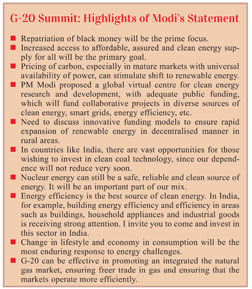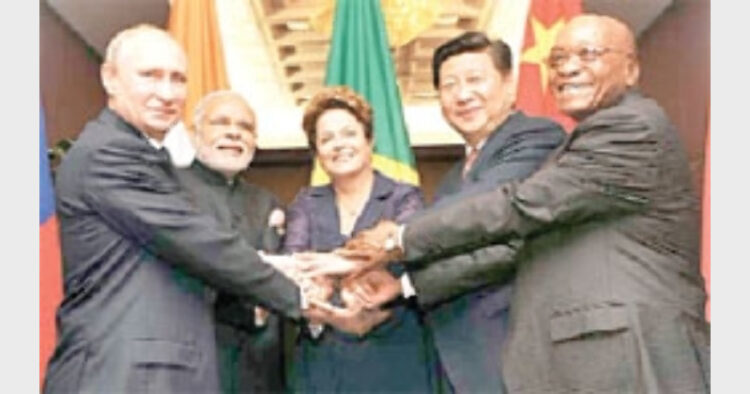 Intro: What has Prime Minister Narendra Modi achieved from the G-20 summit.?
Intro: What has Prime Minister Narendra Modi achieved from the G-20 summit.?
The beginning of Group20 (G-20) summit in Brisbane, Australia has drawn global attention on the issues of reviving global economic growth, strengthening financial stability and rising concern on environmental issues. On economic front, Japan”s recent recession came with an urgent warning to the US, Europe and the rest of the developed world to devise measures to face up this challenge. However, as the event unfolded during the summit the shift was visible from economic agenda to green growth and emission cut. Also, the summit was historic in a sense that Indian Prime Minister Narendra Modi was most sought after leader among others, and his views on key issues drew global media attention at large.
The G-20 includes the world’s largest advanced and emerging economies, including 19 countries plus the European Union. As the participating countries reach key agreements on some broader economic and climate change issues, much depends on the action and exercise of political will for initiatives to turn fruitful in future. The importance of summit could be derived from related developments during the event.
 Firstly, on the issue of leadership the event marked the importance and acceptance of strong Indian leadership. As the event unfolded, Modi was the most sought after head of the government with global leadership applauding him for his historic policy initiative of “Jan Dhan Yojana” to ensure financial inclusion of marginalized and poor. In addition, the event also witnessed the much expected isolation of Russian President Vladimir Putin. He was received at the airport only by a junior minister in Australian Prime Minister Tony Abbott”s government, and left the summit before the final communique outlining the achievements of the summit had been announced. On contrary, Indian leadership received courteous welcome during the summit .
Firstly, on the issue of leadership the event marked the importance and acceptance of strong Indian leadership. As the event unfolded, Modi was the most sought after head of the government with global leadership applauding him for his historic policy initiative of “Jan Dhan Yojana” to ensure financial inclusion of marginalized and poor. In addition, the event also witnessed the much expected isolation of Russian President Vladimir Putin. He was received at the airport only by a junior minister in Australian Prime Minister Tony Abbott”s government, and left the summit before the final communique outlining the achievements of the summit had been announced. On contrary, Indian leadership received courteous welcome during the summit .
Secondly, Prime Minister Modi was able to raise concern on the issue of black money and tax avoidance on the global stage. India managed to get the necessary clause added in the final communique of the summit making it difficult for tax havens to give complete tax exemption to companies. At the end of the two-day summit, the
G-20 issued a communique which included a pledge to modernize international tax rules in a bid for greater transparency. In addition, Indian intent to be part of the “global automatic information-sharing regime” on black money was welcomed by other leaders. Thus, India was able to draw the global attention on the issue of black money calling for “unearthing of black money” under global oversight as unaccounted money, he said, was also linked to security challenges.
Thirdly, India was able to make its point that the economic growth must be people-centric and driven by inclusive social prosperity. The issue of economic growth cannot be de-linked with employment and lack of opportunities. Also the process of reform cannot ignore the concerns of farming economies. For this, India raised the issue of farm subsidies in relation to economic ability of domestic farmers: the summit accepted the U.S. proposal to allow India for an indefinite period to enable farm subsidy reforms. In addition, the final communique was released after the summit of leaders approved a package of 800 measures estimated to increase their economic output by 2.1% by 2018 if fully implemented. In a globally integrated economic system, the measures suggested imbibe a positive impact for Indian economic growth.
India”s “sherpa” (personal representative in the preparations for the summit) Suresh Prabhu has rightly insisted that the G20 must also direct further liberalisation of trade in services, where India has a comparative advantage and which has the potential of unlocking exponential global GDP growth far greater than the benefits of freer trade in goods.
As a sum up, the summit has come with positive developments for key Indian concerns, and also emerged as a platform where the strength of Indian leadership and words was felt at large.
Abhishek Pratap Singh ?(The writer is Doctoral Candidate, School of International Studies, Jawaharlal Nehru University, New Delhi)?
?













Comments